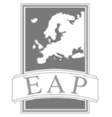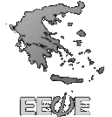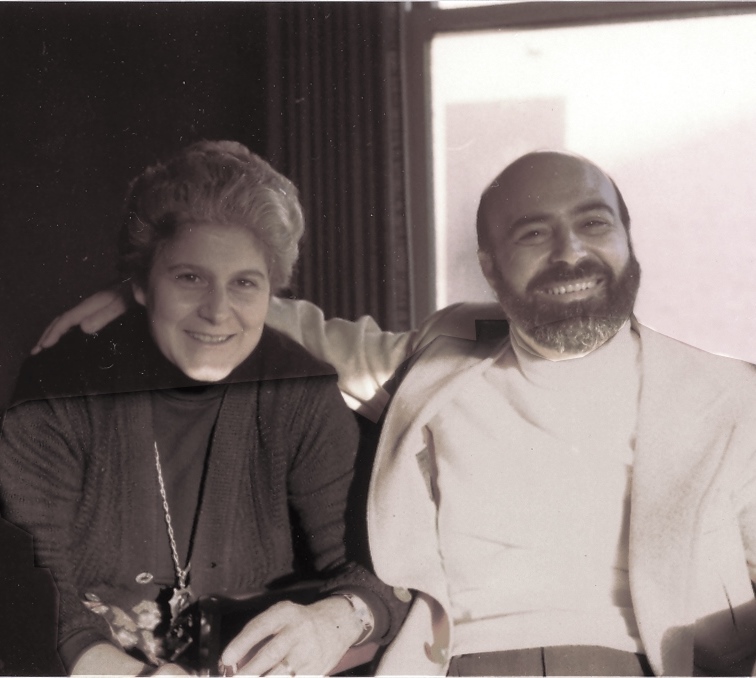
George and Vasso Vassiliou, graduates of Athens Medical University (1953) and of Loyola University of Chicago respectively, were the founders of the Athenian Center for the Study of Humans (1963). A couple in life and fellow travellers in the promotion of systemic approach and group therapy, worked as Psychiatrist and Psychologists respectively with groups all their lives.
George and Vasso Vassiliou, after their basic studies, completed their internship at the Illinois State Psychiatric Center, the Galesburg National Research Hospital and the Loyola University of Chicago. Following that, they worked as permanent staff in these organizations as well as at the Catholic Charity Guidance Center in Chicago.
Upon their return to Greece and the foundation of AIA, they continued to develop their work and their technique in Group and Family Therapy. Vasso Vassiliou was a tenured Psychology professor (1963 – 1975) at Pierce American College and she further developed the “Sequence Analysis Technique” for clinical and socio-educational reasons in the framework of Family Therapy and Training. They developed approaches adapted to the particular cultural and social characteristics of the Greek family, capitalizing on the pioneering research of N. Ackerman, V. Satir, P. Watzlawick, I. Whyne and other scientists from the Palo Alto group, with whom they maintained a long-standing relationship and cooperation, as far back as the ‘60s.
In addition, they themselves developed the “Synallactic Group Image Technique” in group therapy. This specific technique is based on the “Story Sequence Analysis to the Group Process” developed by Arnold M. and modified by Vasso Vassiliou.
AIA’s founders were members with significant positions in International Associations. George Vassiliou was President of the World Association of Social Psychiatry (1978-83), President of the Mediterranean Sociopsychiatric Association (1972-80), first Vice-president of the International Association for Group Psychotherapy (1973-80), member of the Board of Directors of the International Federation for Mental Health (1972-76), Corresponding Fellow from the American Psychiatric Association (APA) and together with Vasso they were elected as Fellows and Master-Trainers of the American Group Psychotherapy Association. Vasso Vasiliou was elected Member of the Board of Directors of the International Association for Group Psychotherapy (1973-80) as well as of the Board of Directors of the International Council of Psychologists (1967-69, 1975-77).
The scientific team as well as hundreds of AIA’s trainees served for decades near Giorgos and Vasso Vassiliou, experiencing through everyday practice what it means to study and serve, via different roles, the human in a way that attests to a conscious presence, systemic look, social responsibility and human warmth.
Over the years, A.I.A.’s Associates have devoted much of their time to developing, establishing and supervising preventive programs which encourage the development of functional groups in various health, educational and community contexts in Greece. In addition to the core activities carried out at the Athenian Institute of Anthropos in Athens, A.I.A.’s Associates, have steadily worked as Master Trainers at several Institutions abroad.
They conduct Training Workshops and Postgraduate Seminars, both in Family Therapy and Group Therapy, at major universities, research centres, health institutions and associations in over 15 countries of Eastern and Western Europe: Bulgaria, Cyprus, Croatia, Czech Republic, Denmark, Former Yugoslavian Republic of Macedonia, Hungary, Italy, Malta, Poland, Portugal, Sweden, Algeria, Serbia, Romania, Turkey, Israel, Russia, United Kingdom, and North America (U.S.A., Canada, Mexico).
Post-Graduate Training and Collaboration has extended over more than two decades with a number of these institutions such as Loyola University (since 1960), Post-Graduate Center for Mental Health of New York (1967 -to date), Medical Academy of Sofia (1975-1991), Tibiscus University of Timisoara Romania, New University of Sofia (1992-to date), Stojanovic University Hospital in Zagreb (1966 -to-date), Hungarian Association for Social Psychiatry in Budapest (1976 -to-date), Institute for the Alcoholic Family in Belgrade, Serbia (1987-to date), Psychiatric Department of the University of Lisbon and Michel Bombarda Hospital in Portugal (1968 -to-date).
Many of these collaborations have taken the form of intensive training programs for groups of professionals from these countries who come to A.I.A. to participate as trainees.
… for the creation of AIA and the way it operates from its foundation up to date, has its basis on collective academic cooperation. It is based on the processes of co-creation, co-production and co-change among AMKA’s associates, and the trainees, related to the interests of the organization and society at large.
AIA in all its activities (training, therapy, intervention in the community etc.) capitalizes on the Systemic – Dialectic Approach, according to which the concept “Human” is perceived as an open, bio-psycho-social, alive system, capable of processing information, making decisions, interacting and processing with the aim of evolving.
In this approach, the “whole” emerges through the interconnection of processes, on many and different levels: the level of the individual, the family, the group, the community, the society, the global “becoming”. It is a multi-level and multi-focused model of intervention which uses on-the-field research within specific cultural frameworks.
The central principle in AIA’s philosophy is the preservation of its independence concerning scientific thought and action. It operates guided by this principle, with an international and intercultural orientation and remains an independent body, financially and socially, promoting communication, interaction and cooperation among its sciences.



